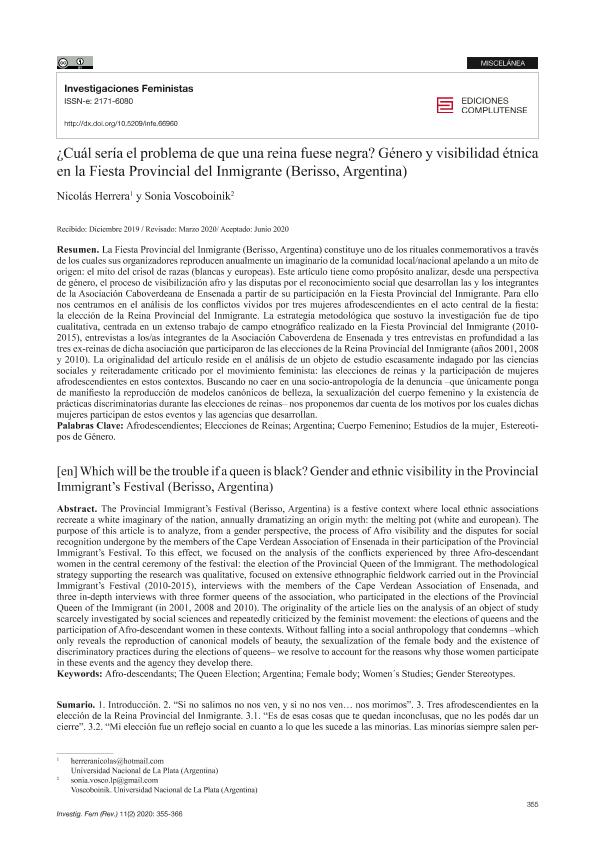Mostrar el registro sencillo del ítem
dc.contributor.author
Herrera, Nicolás

dc.contributor.author
Voscoboinik, Sonia Raquel

dc.date.available
2021-09-15T02:53:22Z
dc.date.issued
2020-06
dc.identifier.citation
Herrera, Nicolás; Voscoboinik, Sonia Raquel; ¿Cuál sería el problema de que una reina fuese negra? Género y visibilidad étnica en la Fiesta Provincial del Inmigrante (Berisso, Argentina); Universidad Complutense de Madrid; Investigaciones Feministas; 11; 2; 6-2020; 355-366
dc.identifier.issn
2171-6080
dc.identifier.uri
http://hdl.handle.net/11336/140360
dc.description.abstract
La Fiesta Provincial del Inmigrante (Berisso, Argentina) constituye uno de los rituales conmemorativos a través de los cuales sus organizadores reproducen anualmente un imaginario de la comunidad local/nacional apelando a un mito de origen: el mito del crisol de razas (blancas y europeas). Este artículo tiene como propósito analizar, desde una perspectiva de género, el proceso de visibilización afro y las disputas por el reconocimiento social que desarrollan las y los integrantes de la Asociación Caboverdeana de Ensenada a partir de su participación en la Fiesta Provincial del Inmigrante. Para ello nos centramos en el análisis de los conflictos vividos por tres mujeres afrodescendientes en el acto central de la fiesta: la elección de la Reina Provincial del Inmigrante. La estrategia metodológica que sostuvo la investigación fue de tipo cualitativa, centrada en un extenso trabajo de campo etnográfico realizado en la Fiesta Provincial del Inmigrante (2010-2015), entrevistas a los/as integrantes de la Asociación Caboverdena de Ensenada y tres entrevistas en profundidad a las tres ex-reinas de dicha asociación que participaron de las elecciones de la Reina Provincial del Inmigrante (años 2001, 2008 y 2010). La originalidad del artículo reside en el análisis de un objeto de estudio escasamente indagado por las ciencias sociales y reiteradamente criticado por el movimiento feminista: las elecciones de reinas y la participación de mujeres afrodescendientes en estos contextos. Buscando no caer en una socio-antropología de la denuncia -que únicamente ponga de manifiesto la reproducción de modelos canónicos de belleza, la sexualización del cuerpo femenino y la existencia de prácticas discriminatorias durante las elecciones de reinas- nos proponemos dar cuenta de los motivos por los cuales dichas mujeres participan de estos eventos y las agencias que desarrollan.
dc.description.abstract
The Provincial Immigrant’s Festival (Berisso, Argentina) is a festive context where local ethnic associations recreate a white imaginary of the nation, annually dramatizing an origin myth: the melting pot (white and european). The purpose of this article is to analyze, from a gender perspective, the process of Afro visibility and the disputes for social recognition undergone by the members of the Cape Verdean Association of Ensenada in their participation of the Provincial Immigrant’s Festival. To this effect, we focused on the analysis of the conflicts experienced by three Afro-descendant women in the central ceremony of the festival: the election of the Provincial Queen of the Immigrant. The methodological strategy supporting the research was qualitative, focused on extensive ethnographic fieldwork carried out in the Provincial Immigrant’s Festival (2010-2015), interviews with the members of the Cape Verdean Association of Ensenada, and three in-depth interviews with three former queens of the association, who participated in the elections of the Provincial Queen of the Immigrant (in 2001, 2008 and 2010). The originality of the article lies on the analysis of an object of study scarcely investigated by social sciences and repeatedly criticized by the feminist movement: the elections of queens and the participation of Afro-descendant women in these contexts. Without falling into a social anthropology that condemns –which only reveals the reproduction of canonical models of beauty, the sexualization of the female body and the existence of discriminatory practices during the elections of queens– we resolve to account for the reasons why those women participate in these events and the agency they develop there.
dc.format
application/pdf
dc.language.iso
spa
dc.publisher
Universidad Complutense de Madrid
dc.rights
info:eu-repo/semantics/openAccess
dc.rights.uri
https://creativecommons.org/licenses/by/2.5/ar/
dc.subject
AFRODESCENDIENTES
dc.subject
ELECCIONES DE REINAS
dc.subject
ARGENTINA
dc.subject
CUERPO FEMENINO
dc.subject
ESTUDIOS DE LA MUJER
dc.subject
ESTEREOTIPOS DE GÉNERO
dc.subject.classification
Tópicos Sociales

dc.subject.classification
Sociología

dc.subject.classification
CIENCIAS SOCIALES

dc.title
¿Cuál sería el problema de que una reina fuese negra? Género y visibilidad étnica en la Fiesta Provincial del Inmigrante (Berisso, Argentina)
dc.title
Which will be the trouble if a queen is black? Gender and ethnic visibility in the Provincial Immigrant’s Festival (Berisso, Argentina)
dc.type
info:eu-repo/semantics/article
dc.type
info:ar-repo/semantics/artículo
dc.type
info:eu-repo/semantics/publishedVersion
dc.date.updated
2021-08-27T20:53:20Z
dc.journal.volume
11
dc.journal.number
2
dc.journal.pagination
355-366
dc.journal.pais
España

dc.journal.ciudad
Madrid
dc.description.fil
Fil: Herrera, Nicolás. Consejo Nacional de Investigaciones Científicas y Técnicas. Centro Científico Tecnológico Conicet - La Plata. Instituto de Investigaciones en Humanidades y Ciencias Sociales. Universidad Nacional de La Plata. Facultad de Humanidades y Ciencias de la Educación. Instituto de Investigaciones en Humanidades y Ciencias Sociales; Argentina
dc.description.fil
Fil: Voscoboinik, Sonia Raquel. Universidad Nacional de La Plata. Facultad de Ciencias Naturales y Museo. División Etnografía; Argentina
dc.journal.title
Investigaciones Feministas
dc.relation.alternativeid
info:eu-repo/semantics/altIdentifier/url/https://revistas.ucm.es/index.php/INFE/article/view/66960
dc.relation.alternativeid
info:eu-repo/semantics/altIdentifier/doi/http://dx.doi.org/10.5209/infe.66960
Archivos asociados
